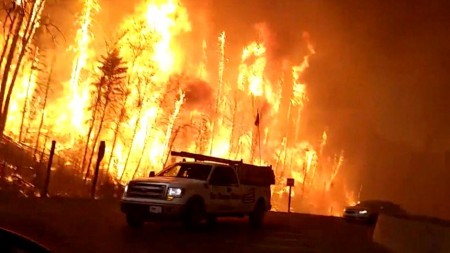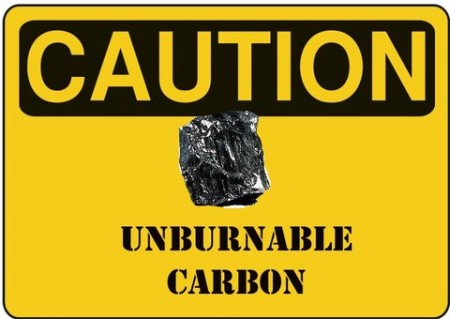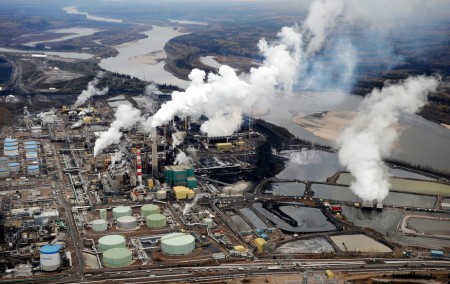May 8, 2016 – Fort McMurray is burning. The urban heart of Alberta’s oil sands projects has been devastated by wildfire. It will take years and tens of billions of dollars to restore its infrastructure. Will its citizens return or will many abandon it? Is this the beginning of the end for the oil sands project, a dream to make Alberta and Northern Saskatchewan the energy giant of the world? In the face of a global community committed to reducing dependence on fossil fuels to turn back the worst excesses of human-induced global warming, will it make sense to rebuild to the scale of the past?
The cause of the wildfire has been attributed to humans. That’s not to say someone lit a match to start it. It’s more a finger of blame pointed at all humanity producing a climate in the Western Canadian Prairie perfect for wildfires – the exaggerated El Nino and warmer Northwest Pacific blob, the consequential regional drought on the Prairie, and a tinder dry forest dominated by black spruce, the perfect incendiary species to act as kindling.
As of today the wildfire has consumed an area larger than Toronto and its neighbouring satellite cities and it is still growing. It will cross from Alberta into Saskatchewan sometime today. Those fighting it expect it to continue for weeks with only rain the potential savior. If you were religious and an environmentalist you might equate the wildfire with the wrath of God descending upon humans for the sin of global warming. But that is a conversation for zealots and not for the rest of us. The zealots would point to God’s hand in reducing oil sands production by more than half and to one of Syncrude‘s facilities north of Fort McMurray being evacuated as the fire threatens to overwhelm it.
I am not religious nor a zealot. And my heart goes out to the many tens of thousands that have been displaced by the events of this last week. I know that a simple donation to the Red Cross will not bring back what has been lost. And continuing to watch the experiences of families caught in the wildfire is frightening.
Maybe it is too soon to raise this issue, but when you consider that Canada is wrestling with reducing carbon emissions to meet its COP21 obligations, one wonders whether building a new infrastructure of oil pipelines from Alberta to tidewater makes sense. Consider the lengthy environmental review process and then the number of years it will take to construct, it would seem that at best Canada will have the use of them for less than a decade.
Why do I say this?
In an editorial appearing in The Guardian this week, Terry Macalister writes that “international oil companies…must completely change their business model or face a ‘nasty, brutish and short’ end within 10 years.” The reason comes from a research paper that looks at the oil majors and their current “wrongheaded” strategies of maximizing bookable reserves while outsourcing development costs to increase shareholder value. As the science of climate change has shown that our burning of fossil fuels is the main culprit, instead of making a move to diversify energy portfolios, the oil majors have doubled down on exploration and production. In the case of Exxon-Mobil the company has done this despite its own scientists providing evidence of the association between climate change and the company’s business. The result, Exxon-Mobil is being investigated in the same way cigarette companies have been in the past.
The report on oil company wrongheadedness points out that all of them have pursued similar strategies and made similar decisions. They have invested in refinery capacity to increase output. They have chosen consolidation and mergers as a way to increase shareholder value without adding any new value. Companies have chosen to undervalue their risk and in the case of BP paid an enormous environmental price with the Deepwater Horizon blowout. They have made little progress in technical innovation and have actually reduced overall research and development budgets for the past decade for the sole purpose of increasing dividend yield. For those who dabbled in renewable energy alternatives the investments have been paltry. Instead they have used their considerable lobbying resources to get governments to give them more oil leases and more places to drill. THey have used patriotism as a weapon to further domestic exploration and drilling in the United States using the notion of ending dependence on foreign oil. In the depressed oil market today where business as usual would seem to be no longer affordable, the companies continue to move ahead with fracking and deep water drilling to further increase bookable reserves. They have been given license to drill in Arctic and Southern Ocean waters by governments eager to take their money in return for leases.
And now the oil companies face climate change and those bookable reserves are likely to be unburnable in the near future. A waste of more than two decades is the best way to describe what’s been going on. Deception, misdirection, spreading doubt about the science of human-global warming have been the oil companies playbook. And when faced with shareholders asking questions about unburnable assets the companiy executives have stonewalled their investors.
The fundamental issue the oil companies face today is well described in the aforementioned research paper:











